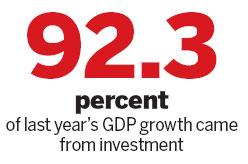The downturn in global demand since the outbreak of the financial crisis prompted China and Asia's other export-led economies to realize that they must carry out economic restructuring and seek new areas of growth, such as expanding domestic demand, for future sustainable development.
China faces severe challenges in the process of economic restructuring. The nation has put much emphasis on government spending and investment during the financial crisis to stimulate the economy, but domestic consumption is still weak.

China's GDP growth was 8.7 percent last year, mainly thanks to the government's massive stimulus package, which is heavily investment-orientated.
Investment contributed 92.3 percent of the growth, with domestic consumption comrising the rest as net exports fell 44.8 percent, according to National Bureau of Statistics.
As the effect of the 4 trillion yuan ($586 billion) stimulus package gradually fades, China has to transform the economy into one driven more by household spending.
However, analysts point out the challenges China faces: "The main reason why Chinese consumers are reluctant to spend money is that they don't feel secure about their future, in particular, in healthcare and education," said Cao Huining, a professor of Finance at Cheung Kong Graduate School of Business.
"The government should attach great importance to improving public services, including healthcare, education and housing, so as to boost consumer confidence," he said.
Also, raising the individual income tax threshold is another possible option to encourage households to spend more, Cao added. China's current monthly individual income tax cutoff point is 2,000 yuan.
Therefore, for the government, to boost domestic consumption entails launching a series of reforms to improve people's livelihoods.
In addition, China's economic restructuring, shifting away from an export-led growth pattern to domestic-oriented pattern, does not mean giving up the export industry.
"Instead, China should produce more sophisticated products with more added value for exports in the future," said Giles Chance, a visiting professor of Guanghua School of Management at Peking University.
The Chinese government should encourage innovation, so as to change the current situation that the vast majority of export products are just made in China but have no added value he said.





